Analysis of BREXIT's Impact on UK Retail and Government Intervention
VerifiedAdded on 2023/01/07
|8
|2397
|93
Report
AI Summary
This report examines the impact of BREXIT on the UK retail sector, focusing on government interventions and the application of welfare economics theories. The introduction outlines the business environment and the context of BREXIT's effects on the retail market. The report delves into government interventions, discussing theories such as Pareto Optimality, Kaldor–Hicks Compensation Criteria, Social Welfare Function, Scitovisky Criterion, and Amartya Sen’s Theory of Welfare to analyze government actions post-BREXIT. It explores trade restrictions, compensation mechanisms, and the impact of these measures on economic growth and social welfare. The analysis includes criticisms and considerations of political influence, compensation inequalities, and the overall effects on businesses, particularly small-scale enterprises, concluding with a summary of the findings.
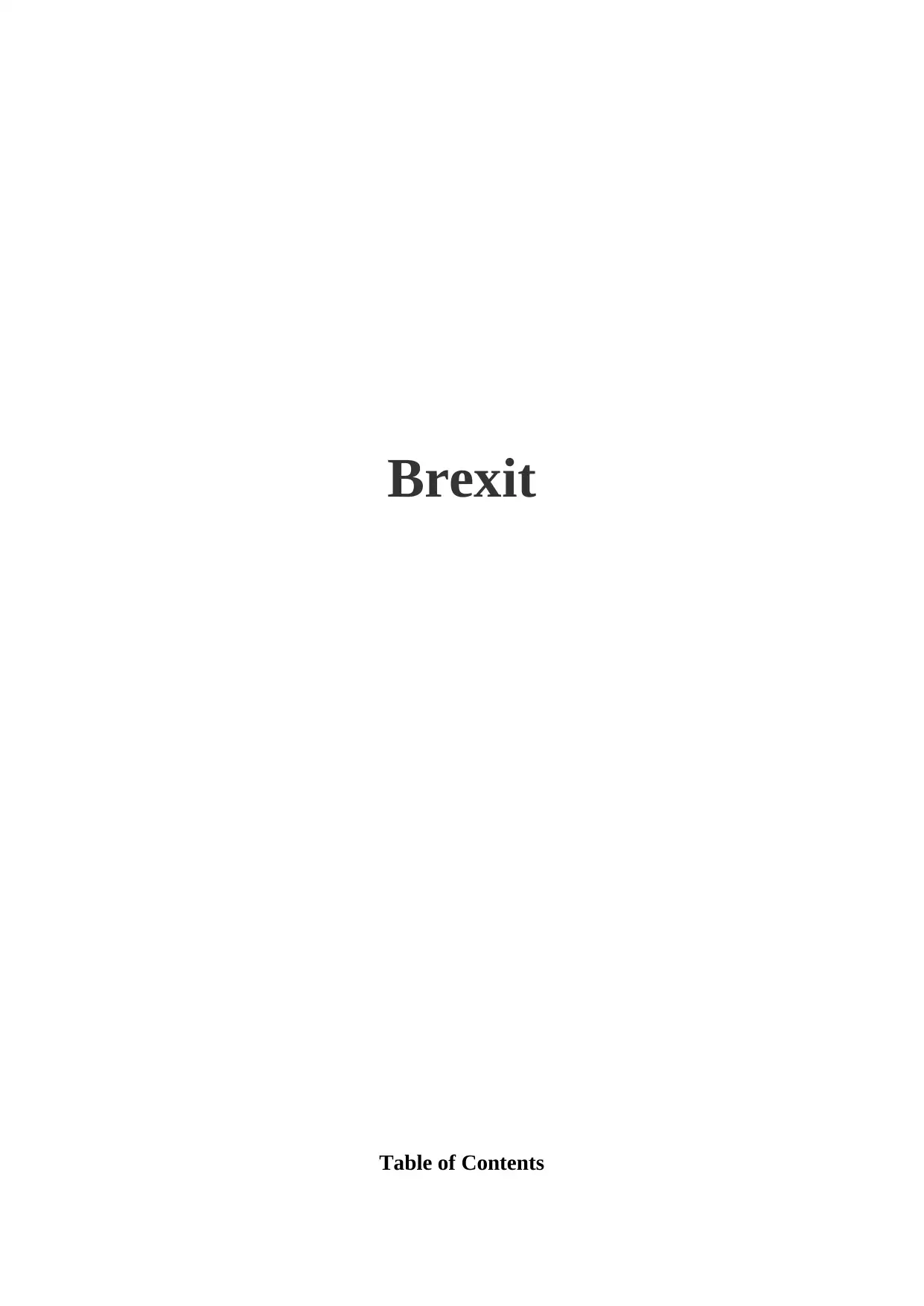
Brexit
Table of Contents
Table of Contents
Paraphrase This Document
Need a fresh take? Get an instant paraphrase of this document with our AI Paraphraser
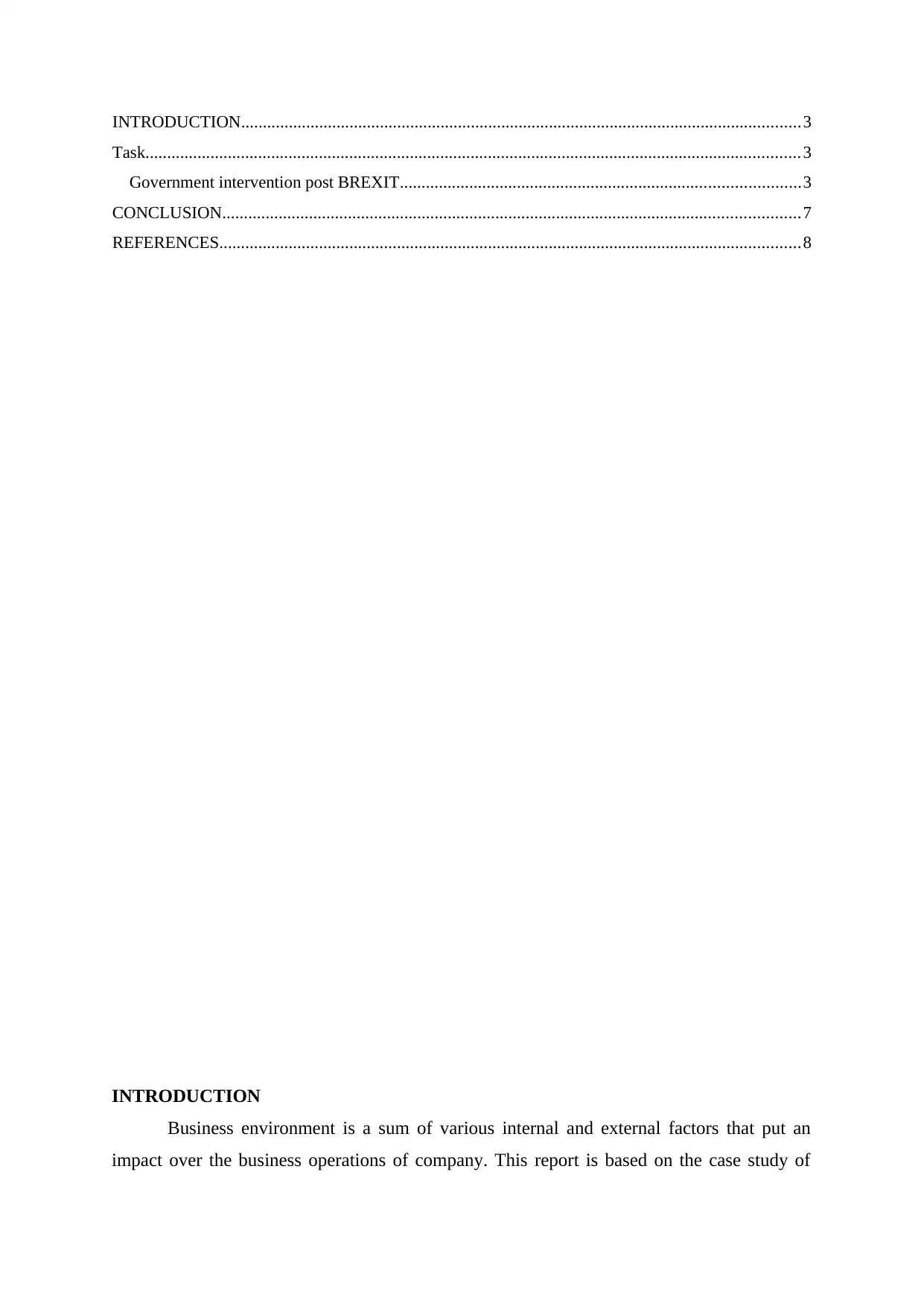
INTRODUCTION.................................................................................................................................3
Task.......................................................................................................................................................3
Government intervention post BREXIT............................................................................................3
CONCLUSION.....................................................................................................................................7
REFERENCES......................................................................................................................................8
INTRODUCTION
Business environment is a sum of various internal and external factors that put an
impact over the business operations of company. This report is based on the case study of
Task.......................................................................................................................................................3
Government intervention post BREXIT............................................................................................3
CONCLUSION.....................................................................................................................................7
REFERENCES......................................................................................................................................8
INTRODUCTION
Business environment is a sum of various internal and external factors that put an
impact over the business operations of company. This report is based on the case study of
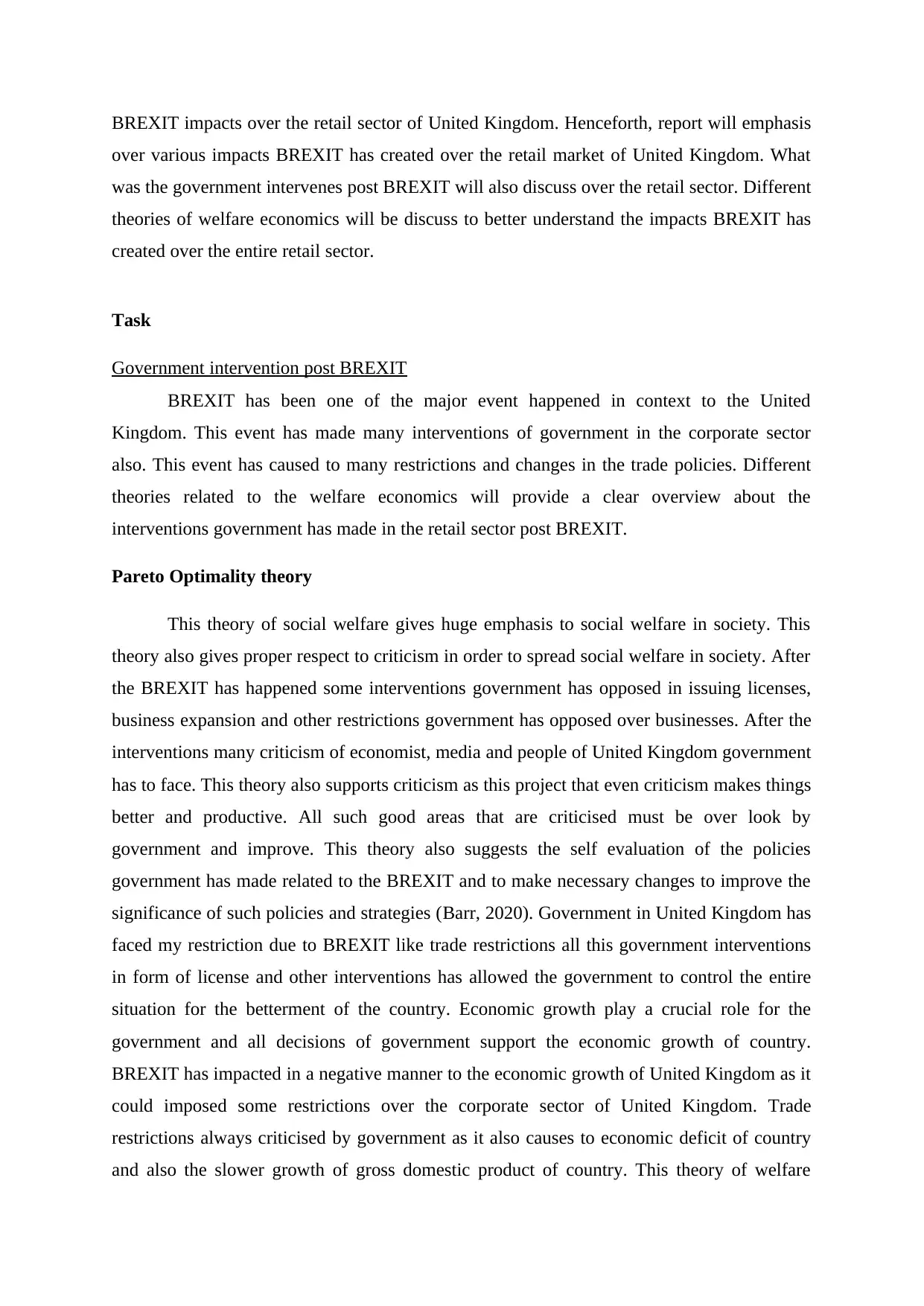
BREXIT impacts over the retail sector of United Kingdom. Henceforth, report will emphasis
over various impacts BREXIT has created over the retail market of United Kingdom. What
was the government intervenes post BREXIT will also discuss over the retail sector. Different
theories of welfare economics will be discuss to better understand the impacts BREXIT has
created over the entire retail sector.
Task
Government intervention post BREXIT
BREXIT has been one of the major event happened in context to the United
Kingdom. This event has made many interventions of government in the corporate sector
also. This event has caused to many restrictions and changes in the trade policies. Different
theories related to the welfare economics will provide a clear overview about the
interventions government has made in the retail sector post BREXIT.
Pareto Optimality theory
This theory of social welfare gives huge emphasis to social welfare in society. This
theory also gives proper respect to criticism in order to spread social welfare in society. After
the BREXIT has happened some interventions government has opposed in issuing licenses,
business expansion and other restrictions government has opposed over businesses. After the
interventions many criticism of economist, media and people of United Kingdom government
has to face. This theory also supports criticism as this project that even criticism makes things
better and productive. All such good areas that are criticised must be over look by
government and improve. This theory also suggests the self evaluation of the policies
government has made related to the BREXIT and to make necessary changes to improve the
significance of such policies and strategies (Barr, 2020). Government in United Kingdom has
faced my restriction due to BREXIT like trade restrictions all this government interventions
in form of license and other interventions has allowed the government to control the entire
situation for the betterment of the country. Economic growth play a crucial role for the
government and all decisions of government support the economic growth of country.
BREXIT has impacted in a negative manner to the economic growth of United Kingdom as it
could imposed some restrictions over the corporate sector of United Kingdom. Trade
restrictions always criticised by government as it also causes to economic deficit of country
and also the slower growth of gross domestic product of country. This theory of welfare
over various impacts BREXIT has created over the retail market of United Kingdom. What
was the government intervenes post BREXIT will also discuss over the retail sector. Different
theories of welfare economics will be discuss to better understand the impacts BREXIT has
created over the entire retail sector.
Task
Government intervention post BREXIT
BREXIT has been one of the major event happened in context to the United
Kingdom. This event has made many interventions of government in the corporate sector
also. This event has caused to many restrictions and changes in the trade policies. Different
theories related to the welfare economics will provide a clear overview about the
interventions government has made in the retail sector post BREXIT.
Pareto Optimality theory
This theory of social welfare gives huge emphasis to social welfare in society. This
theory also gives proper respect to criticism in order to spread social welfare in society. After
the BREXIT has happened some interventions government has opposed in issuing licenses,
business expansion and other restrictions government has opposed over businesses. After the
interventions many criticism of economist, media and people of United Kingdom government
has to face. This theory also supports criticism as this project that even criticism makes things
better and productive. All such good areas that are criticised must be over look by
government and improve. This theory also suggests the self evaluation of the policies
government has made related to the BREXIT and to make necessary changes to improve the
significance of such policies and strategies (Barr, 2020). Government in United Kingdom has
faced my restriction due to BREXIT like trade restrictions all this government interventions
in form of license and other interventions has allowed the government to control the entire
situation for the betterment of the country. Economic growth play a crucial role for the
government and all decisions of government support the economic growth of country.
BREXIT has impacted in a negative manner to the economic growth of United Kingdom as it
could imposed some restrictions over the corporate sector of United Kingdom. Trade
restrictions always criticised by government as it also causes to economic deficit of country
and also the slower growth of gross domestic product of country. This theory of welfare
⊘ This is a preview!⊘
Do you want full access?
Subscribe today to unlock all pages.

Trusted by 1+ million students worldwide
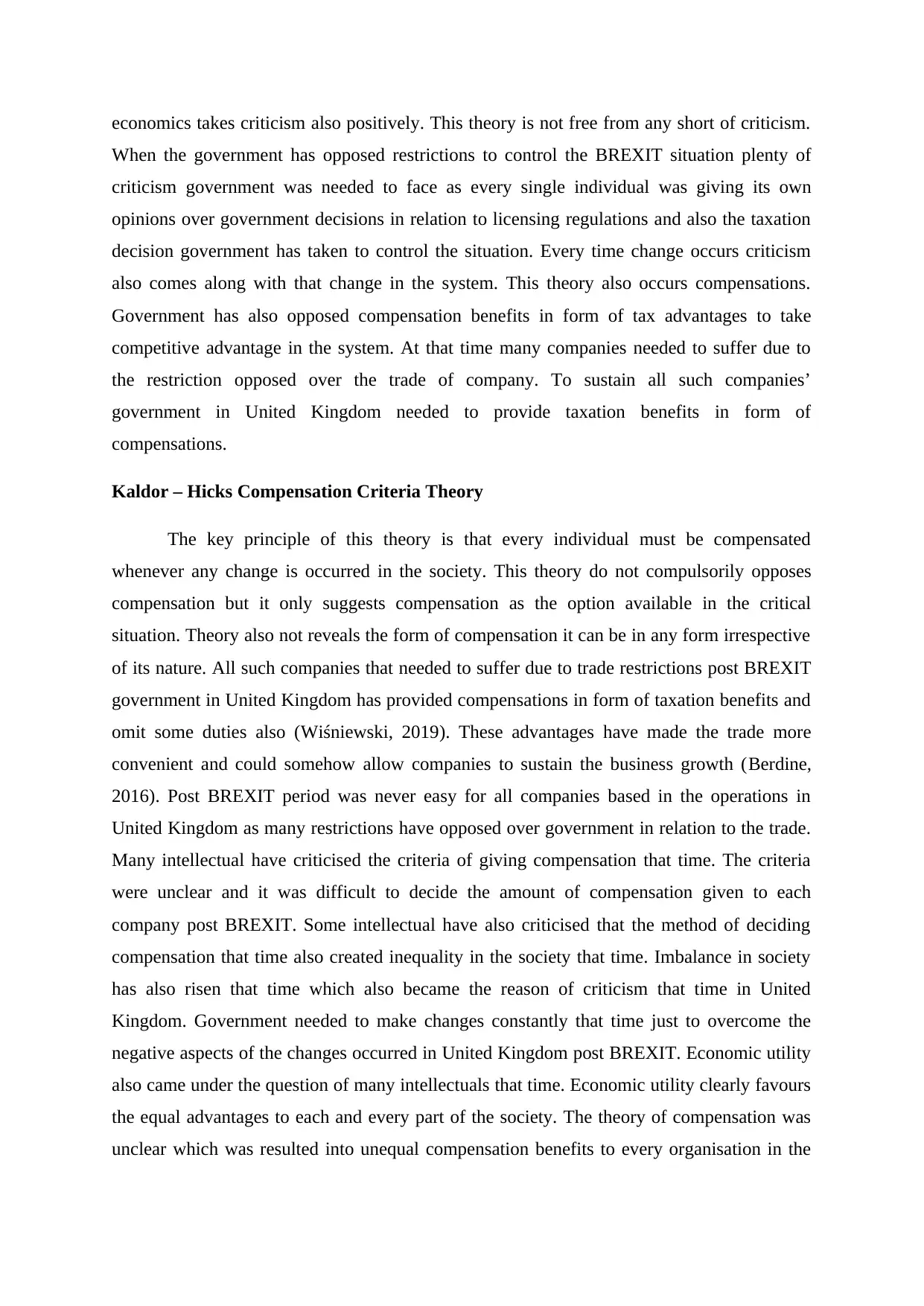
economics takes criticism also positively. This theory is not free from any short of criticism.
When the government has opposed restrictions to control the BREXIT situation plenty of
criticism government was needed to face as every single individual was giving its own
opinions over government decisions in relation to licensing regulations and also the taxation
decision government has taken to control the situation. Every time change occurs criticism
also comes along with that change in the system. This theory also occurs compensations.
Government has also opposed compensation benefits in form of tax advantages to take
competitive advantage in the system. At that time many companies needed to suffer due to
the restriction opposed over the trade of company. To sustain all such companies’
government in United Kingdom needed to provide taxation benefits in form of
compensations.
Kaldor – Hicks Compensation Criteria Theory
The key principle of this theory is that every individual must be compensated
whenever any change is occurred in the society. This theory do not compulsorily opposes
compensation but it only suggests compensation as the option available in the critical
situation. Theory also not reveals the form of compensation it can be in any form irrespective
of its nature. All such companies that needed to suffer due to trade restrictions post BREXIT
government in United Kingdom has provided compensations in form of taxation benefits and
omit some duties also (Wiśniewski, 2019). These advantages have made the trade more
convenient and could somehow allow companies to sustain the business growth (Berdine,
2016). Post BREXIT period was never easy for all companies based in the operations in
United Kingdom as many restrictions have opposed over government in relation to the trade.
Many intellectual have criticised the criteria of giving compensation that time. The criteria
were unclear and it was difficult to decide the amount of compensation given to each
company post BREXIT. Some intellectual have also criticised that the method of deciding
compensation that time also created inequality in the society that time. Imbalance in society
has also risen that time which also became the reason of criticism that time in United
Kingdom. Government needed to make changes constantly that time just to overcome the
negative aspects of the changes occurred in United Kingdom post BREXIT. Economic utility
also came under the question of many intellectuals that time. Economic utility clearly favours
the equal advantages to each and every part of the society. The theory of compensation was
unclear which was resulted into unequal compensation benefits to every organisation in the
When the government has opposed restrictions to control the BREXIT situation plenty of
criticism government was needed to face as every single individual was giving its own
opinions over government decisions in relation to licensing regulations and also the taxation
decision government has taken to control the situation. Every time change occurs criticism
also comes along with that change in the system. This theory also occurs compensations.
Government has also opposed compensation benefits in form of tax advantages to take
competitive advantage in the system. At that time many companies needed to suffer due to
the restriction opposed over the trade of company. To sustain all such companies’
government in United Kingdom needed to provide taxation benefits in form of
compensations.
Kaldor – Hicks Compensation Criteria Theory
The key principle of this theory is that every individual must be compensated
whenever any change is occurred in the society. This theory do not compulsorily opposes
compensation but it only suggests compensation as the option available in the critical
situation. Theory also not reveals the form of compensation it can be in any form irrespective
of its nature. All such companies that needed to suffer due to trade restrictions post BREXIT
government in United Kingdom has provided compensations in form of taxation benefits and
omit some duties also (Wiśniewski, 2019). These advantages have made the trade more
convenient and could somehow allow companies to sustain the business growth (Berdine,
2016). Post BREXIT period was never easy for all companies based in the operations in
United Kingdom as many restrictions have opposed over government in relation to the trade.
Many intellectual have criticised the criteria of giving compensation that time. The criteria
were unclear and it was difficult to decide the amount of compensation given to each
company post BREXIT. Some intellectual have also criticised that the method of deciding
compensation that time also created inequality in the society that time. Imbalance in society
has also risen that time which also became the reason of criticism that time in United
Kingdom. Government needed to make changes constantly that time just to overcome the
negative aspects of the changes occurred in United Kingdom post BREXIT. Economic utility
also came under the question of many intellectuals that time. Economic utility clearly favours
the equal advantages to each and every part of the society. The theory of compensation was
unclear which was resulted into unequal compensation benefits to every organisation in the
Paraphrase This Document
Need a fresh take? Get an instant paraphrase of this document with our AI Paraphraser
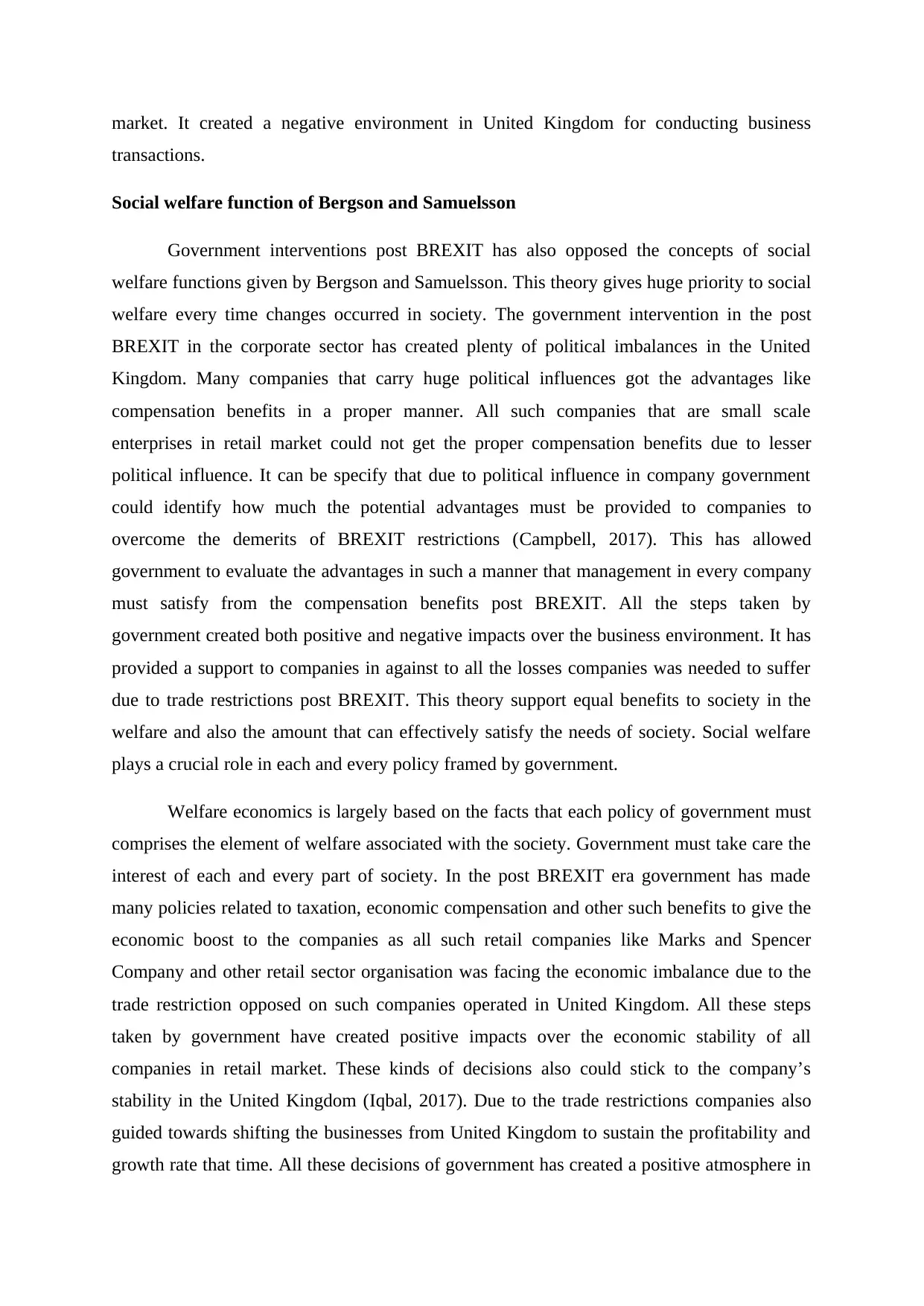
market. It created a negative environment in United Kingdom for conducting business
transactions.
Social welfare function of Bergson and Samuelsson
Government interventions post BREXIT has also opposed the concepts of social
welfare functions given by Bergson and Samuelsson. This theory gives huge priority to social
welfare every time changes occurred in society. The government intervention in the post
BREXIT in the corporate sector has created plenty of political imbalances in the United
Kingdom. Many companies that carry huge political influences got the advantages like
compensation benefits in a proper manner. All such companies that are small scale
enterprises in retail market could not get the proper compensation benefits due to lesser
political influence. It can be specify that due to political influence in company government
could identify how much the potential advantages must be provided to companies to
overcome the demerits of BREXIT restrictions (Campbell, 2017). This has allowed
government to evaluate the advantages in such a manner that management in every company
must satisfy from the compensation benefits post BREXIT. All the steps taken by
government created both positive and negative impacts over the business environment. It has
provided a support to companies in against to all the losses companies was needed to suffer
due to trade restrictions post BREXIT. This theory support equal benefits to society in the
welfare and also the amount that can effectively satisfy the needs of society. Social welfare
plays a crucial role in each and every policy framed by government.
Welfare economics is largely based on the facts that each policy of government must
comprises the element of welfare associated with the society. Government must take care the
interest of each and every part of society. In the post BREXIT era government has made
many policies related to taxation, economic compensation and other such benefits to give the
economic boost to the companies as all such retail companies like Marks and Spencer
Company and other retail sector organisation was facing the economic imbalance due to the
trade restriction opposed on such companies operated in United Kingdom. All these steps
taken by government have created positive impacts over the economic stability of all
companies in retail market. These kinds of decisions also could stick to the company’s
stability in the United Kingdom (Iqbal, 2017). Due to the trade restrictions companies also
guided towards shifting the businesses from United Kingdom to sustain the profitability and
growth rate that time. All these decisions of government has created a positive atmosphere in
transactions.
Social welfare function of Bergson and Samuelsson
Government interventions post BREXIT has also opposed the concepts of social
welfare functions given by Bergson and Samuelsson. This theory gives huge priority to social
welfare every time changes occurred in society. The government intervention in the post
BREXIT in the corporate sector has created plenty of political imbalances in the United
Kingdom. Many companies that carry huge political influences got the advantages like
compensation benefits in a proper manner. All such companies that are small scale
enterprises in retail market could not get the proper compensation benefits due to lesser
political influence. It can be specify that due to political influence in company government
could identify how much the potential advantages must be provided to companies to
overcome the demerits of BREXIT restrictions (Campbell, 2017). This has allowed
government to evaluate the advantages in such a manner that management in every company
must satisfy from the compensation benefits post BREXIT. All the steps taken by
government created both positive and negative impacts over the business environment. It has
provided a support to companies in against to all the losses companies was needed to suffer
due to trade restrictions post BREXIT. This theory support equal benefits to society in the
welfare and also the amount that can effectively satisfy the needs of society. Social welfare
plays a crucial role in each and every policy framed by government.
Welfare economics is largely based on the facts that each policy of government must
comprises the element of welfare associated with the society. Government must take care the
interest of each and every part of society. In the post BREXIT era government has made
many policies related to taxation, economic compensation and other such benefits to give the
economic boost to the companies as all such retail companies like Marks and Spencer
Company and other retail sector organisation was facing the economic imbalance due to the
trade restriction opposed on such companies operated in United Kingdom. All these steps
taken by government have created positive impacts over the economic stability of all
companies in retail market. These kinds of decisions also could stick to the company’s
stability in the United Kingdom (Iqbal, 2017). Due to the trade restrictions companies also
guided towards shifting the businesses from United Kingdom to sustain the profitability and
growth rate that time. All these decisions of government has created a positive atmosphere in
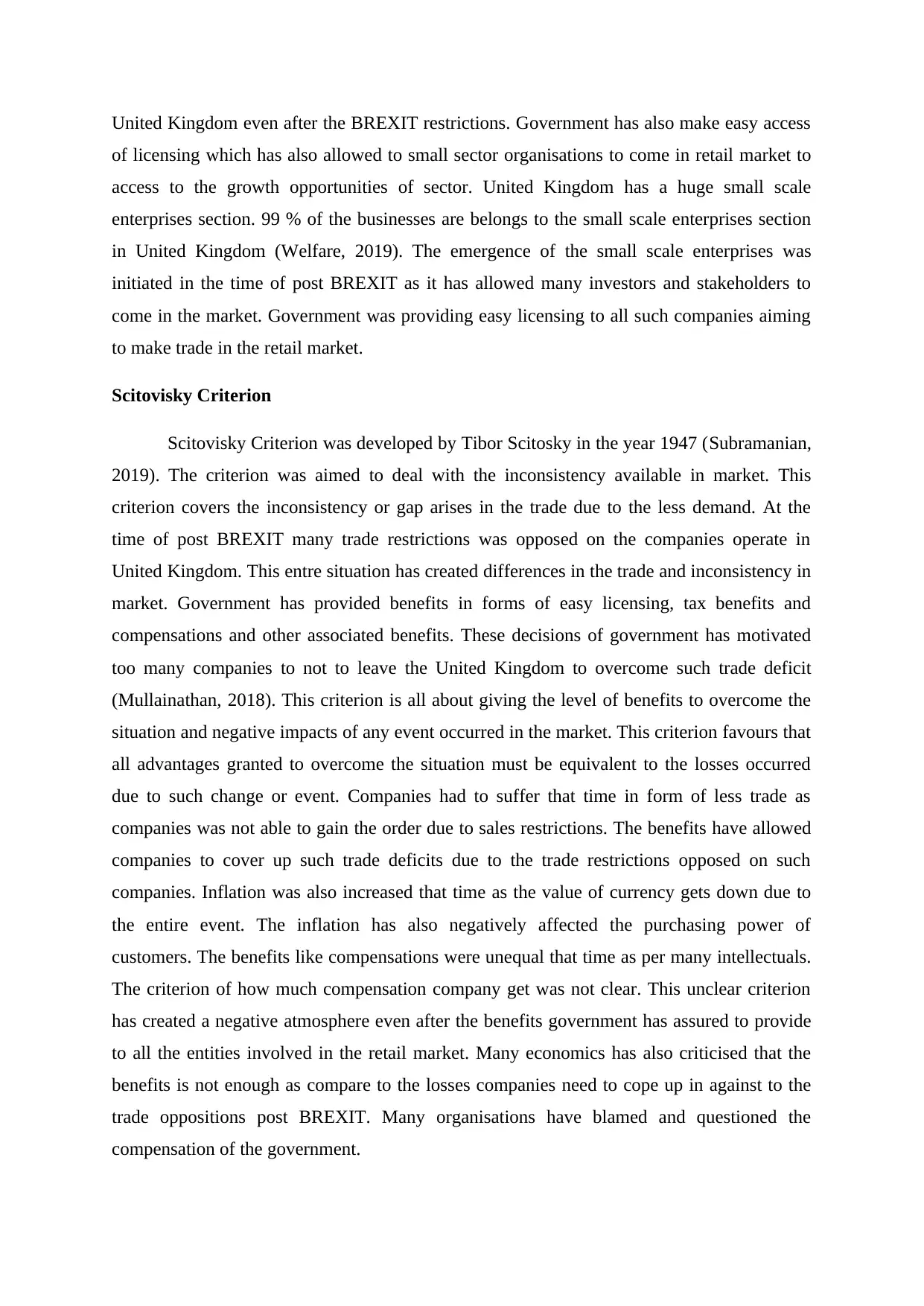
United Kingdom even after the BREXIT restrictions. Government has also make easy access
of licensing which has also allowed to small sector organisations to come in retail market to
access to the growth opportunities of sector. United Kingdom has a huge small scale
enterprises section. 99 % of the businesses are belongs to the small scale enterprises section
in United Kingdom (Welfare, 2019). The emergence of the small scale enterprises was
initiated in the time of post BREXIT as it has allowed many investors and stakeholders to
come in the market. Government was providing easy licensing to all such companies aiming
to make trade in the retail market.
Scitovisky Criterion
Scitovisky Criterion was developed by Tibor Scitosky in the year 1947 (Subramanian,
2019). The criterion was aimed to deal with the inconsistency available in market. This
criterion covers the inconsistency or gap arises in the trade due to the less demand. At the
time of post BREXIT many trade restrictions was opposed on the companies operate in
United Kingdom. This entre situation has created differences in the trade and inconsistency in
market. Government has provided benefits in forms of easy licensing, tax benefits and
compensations and other associated benefits. These decisions of government has motivated
too many companies to not to leave the United Kingdom to overcome such trade deficit
(Mullainathan, 2018). This criterion is all about giving the level of benefits to overcome the
situation and negative impacts of any event occurred in the market. This criterion favours that
all advantages granted to overcome the situation must be equivalent to the losses occurred
due to such change or event. Companies had to suffer that time in form of less trade as
companies was not able to gain the order due to sales restrictions. The benefits have allowed
companies to cover up such trade deficits due to the trade restrictions opposed on such
companies. Inflation was also increased that time as the value of currency gets down due to
the entire event. The inflation has also negatively affected the purchasing power of
customers. The benefits like compensations were unequal that time as per many intellectuals.
The criterion of how much compensation company get was not clear. This unclear criterion
has created a negative atmosphere even after the benefits government has assured to provide
to all the entities involved in the retail market. Many economics has also criticised that the
benefits is not enough as compare to the losses companies need to cope up in against to the
trade oppositions post BREXIT. Many organisations have blamed and questioned the
compensation of the government.
of licensing which has also allowed to small sector organisations to come in retail market to
access to the growth opportunities of sector. United Kingdom has a huge small scale
enterprises section. 99 % of the businesses are belongs to the small scale enterprises section
in United Kingdom (Welfare, 2019). The emergence of the small scale enterprises was
initiated in the time of post BREXIT as it has allowed many investors and stakeholders to
come in the market. Government was providing easy licensing to all such companies aiming
to make trade in the retail market.
Scitovisky Criterion
Scitovisky Criterion was developed by Tibor Scitosky in the year 1947 (Subramanian,
2019). The criterion was aimed to deal with the inconsistency available in market. This
criterion covers the inconsistency or gap arises in the trade due to the less demand. At the
time of post BREXIT many trade restrictions was opposed on the companies operate in
United Kingdom. This entre situation has created differences in the trade and inconsistency in
market. Government has provided benefits in forms of easy licensing, tax benefits and
compensations and other associated benefits. These decisions of government has motivated
too many companies to not to leave the United Kingdom to overcome such trade deficit
(Mullainathan, 2018). This criterion is all about giving the level of benefits to overcome the
situation and negative impacts of any event occurred in the market. This criterion favours that
all advantages granted to overcome the situation must be equivalent to the losses occurred
due to such change or event. Companies had to suffer that time in form of less trade as
companies was not able to gain the order due to sales restrictions. The benefits have allowed
companies to cover up such trade deficits due to the trade restrictions opposed on such
companies. Inflation was also increased that time as the value of currency gets down due to
the entire event. The inflation has also negatively affected the purchasing power of
customers. The benefits like compensations were unequal that time as per many intellectuals.
The criterion of how much compensation company get was not clear. This unclear criterion
has created a negative atmosphere even after the benefits government has assured to provide
to all the entities involved in the retail market. Many economics has also criticised that the
benefits is not enough as compare to the losses companies need to cope up in against to the
trade oppositions post BREXIT. Many organisations have blamed and questioned the
compensation of the government.
⊘ This is a preview!⊘
Do you want full access?
Subscribe today to unlock all pages.

Trusted by 1+ million students worldwide
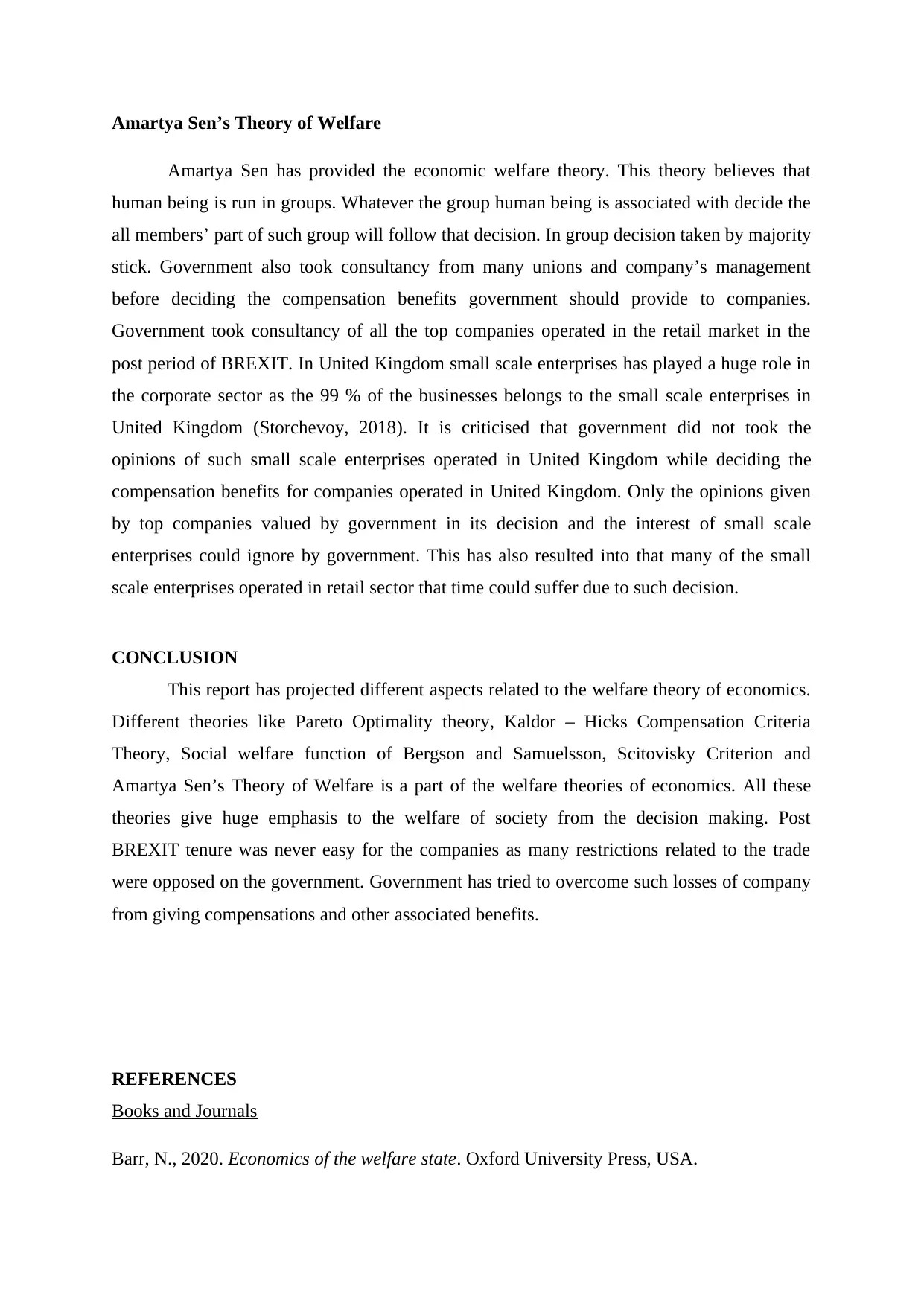
Amartya Sen’s Theory of Welfare
Amartya Sen has provided the economic welfare theory. This theory believes that
human being is run in groups. Whatever the group human being is associated with decide the
all members’ part of such group will follow that decision. In group decision taken by majority
stick. Government also took consultancy from many unions and company’s management
before deciding the compensation benefits government should provide to companies.
Government took consultancy of all the top companies operated in the retail market in the
post period of BREXIT. In United Kingdom small scale enterprises has played a huge role in
the corporate sector as the 99 % of the businesses belongs to the small scale enterprises in
United Kingdom (Storchevoy, 2018). It is criticised that government did not took the
opinions of such small scale enterprises operated in United Kingdom while deciding the
compensation benefits for companies operated in United Kingdom. Only the opinions given
by top companies valued by government in its decision and the interest of small scale
enterprises could ignore by government. This has also resulted into that many of the small
scale enterprises operated in retail sector that time could suffer due to such decision.
CONCLUSION
This report has projected different aspects related to the welfare theory of economics.
Different theories like Pareto Optimality theory, Kaldor – Hicks Compensation Criteria
Theory, Social welfare function of Bergson and Samuelsson, Scitovisky Criterion and
Amartya Sen’s Theory of Welfare is a part of the welfare theories of economics. All these
theories give huge emphasis to the welfare of society from the decision making. Post
BREXIT tenure was never easy for the companies as many restrictions related to the trade
were opposed on the government. Government has tried to overcome such losses of company
from giving compensations and other associated benefits.
REFERENCES
Books and Journals
Barr, N., 2020. Economics of the welfare state. Oxford University Press, USA.
Amartya Sen has provided the economic welfare theory. This theory believes that
human being is run in groups. Whatever the group human being is associated with decide the
all members’ part of such group will follow that decision. In group decision taken by majority
stick. Government also took consultancy from many unions and company’s management
before deciding the compensation benefits government should provide to companies.
Government took consultancy of all the top companies operated in the retail market in the
post period of BREXIT. In United Kingdom small scale enterprises has played a huge role in
the corporate sector as the 99 % of the businesses belongs to the small scale enterprises in
United Kingdom (Storchevoy, 2018). It is criticised that government did not took the
opinions of such small scale enterprises operated in United Kingdom while deciding the
compensation benefits for companies operated in United Kingdom. Only the opinions given
by top companies valued by government in its decision and the interest of small scale
enterprises could ignore by government. This has also resulted into that many of the small
scale enterprises operated in retail sector that time could suffer due to such decision.
CONCLUSION
This report has projected different aspects related to the welfare theory of economics.
Different theories like Pareto Optimality theory, Kaldor – Hicks Compensation Criteria
Theory, Social welfare function of Bergson and Samuelsson, Scitovisky Criterion and
Amartya Sen’s Theory of Welfare is a part of the welfare theories of economics. All these
theories give huge emphasis to the welfare of society from the decision making. Post
BREXIT tenure was never easy for the companies as many restrictions related to the trade
were opposed on the government. Government has tried to overcome such losses of company
from giving compensations and other associated benefits.
REFERENCES
Books and Journals
Barr, N., 2020. Economics of the welfare state. Oxford University Press, USA.
Paraphrase This Document
Need a fresh take? Get an instant paraphrase of this document with our AI Paraphraser
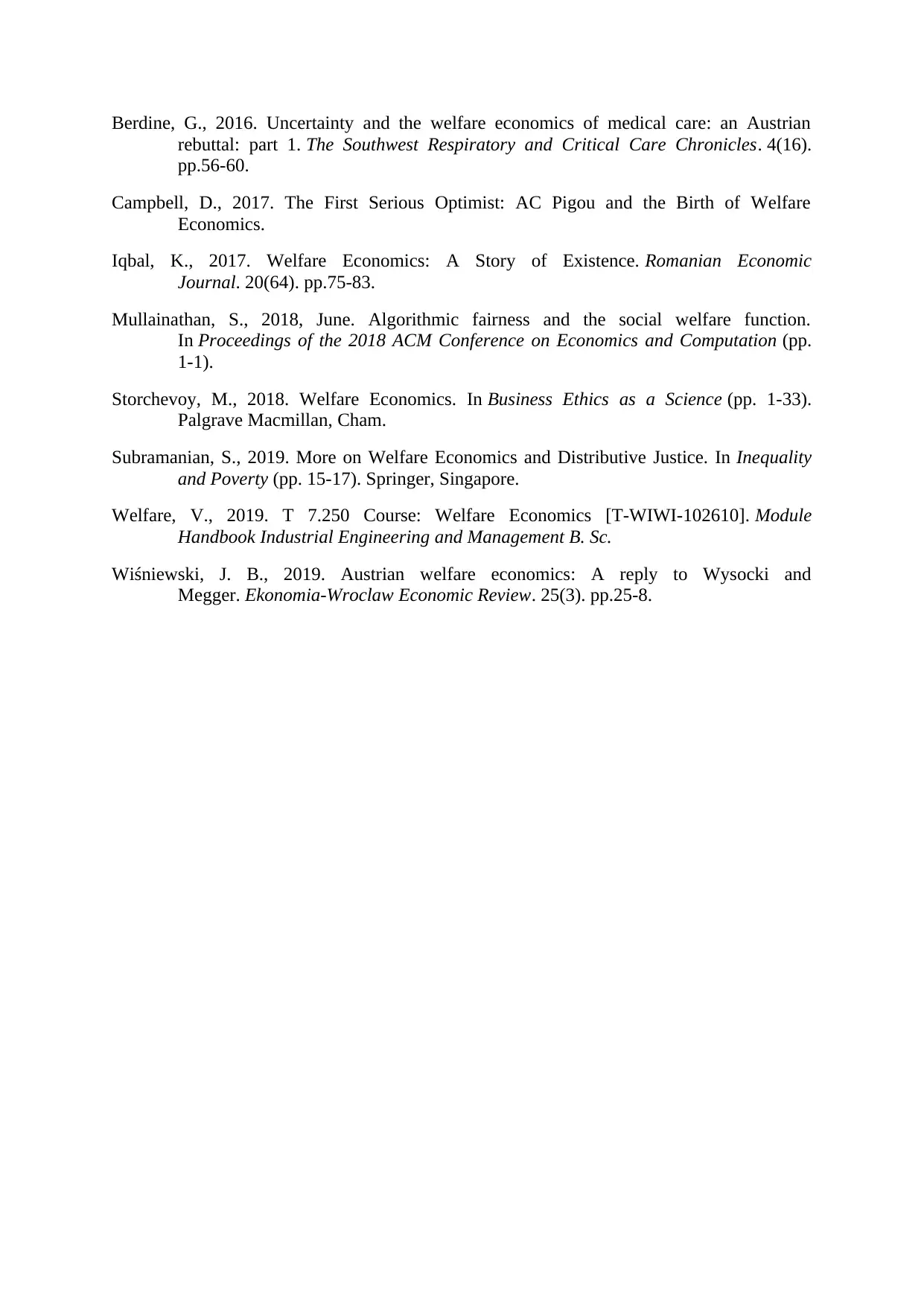
Berdine, G., 2016. Uncertainty and the welfare economics of medical care: an Austrian
rebuttal: part 1. The Southwest Respiratory and Critical Care Chronicles. 4(16).
pp.56-60.
Campbell, D., 2017. The First Serious Optimist: AC Pigou and the Birth of Welfare
Economics.
Iqbal, K., 2017. Welfare Economics: A Story of Existence. Romanian Economic
Journal. 20(64). pp.75-83.
Mullainathan, S., 2018, June. Algorithmic fairness and the social welfare function.
In Proceedings of the 2018 ACM Conference on Economics and Computation (pp.
1-1).
Storchevoy, M., 2018. Welfare Economics. In Business Ethics as a Science (pp. 1-33).
Palgrave Macmillan, Cham.
Subramanian, S., 2019. More on Welfare Economics and Distributive Justice. In Inequality
and Poverty (pp. 15-17). Springer, Singapore.
Welfare, V., 2019. T 7.250 Course: Welfare Economics [T-WIWI-102610]. Module
Handbook Industrial Engineering and Management B. Sc.
Wiśniewski, J. B., 2019. Austrian welfare economics: A reply to Wysocki and
Megger. Ekonomia-Wroclaw Economic Review. 25(3). pp.25-8.
rebuttal: part 1. The Southwest Respiratory and Critical Care Chronicles. 4(16).
pp.56-60.
Campbell, D., 2017. The First Serious Optimist: AC Pigou and the Birth of Welfare
Economics.
Iqbal, K., 2017. Welfare Economics: A Story of Existence. Romanian Economic
Journal. 20(64). pp.75-83.
Mullainathan, S., 2018, June. Algorithmic fairness and the social welfare function.
In Proceedings of the 2018 ACM Conference on Economics and Computation (pp.
1-1).
Storchevoy, M., 2018. Welfare Economics. In Business Ethics as a Science (pp. 1-33).
Palgrave Macmillan, Cham.
Subramanian, S., 2019. More on Welfare Economics and Distributive Justice. In Inequality
and Poverty (pp. 15-17). Springer, Singapore.
Welfare, V., 2019. T 7.250 Course: Welfare Economics [T-WIWI-102610]. Module
Handbook Industrial Engineering and Management B. Sc.
Wiśniewski, J. B., 2019. Austrian welfare economics: A reply to Wysocki and
Megger. Ekonomia-Wroclaw Economic Review. 25(3). pp.25-8.
1 out of 8
Related Documents
Your All-in-One AI-Powered Toolkit for Academic Success.
+13062052269
info@desklib.com
Available 24*7 on WhatsApp / Email
![[object Object]](/_next/static/media/star-bottom.7253800d.svg)
Unlock your academic potential
Copyright © 2020–2026 A2Z Services. All Rights Reserved. Developed and managed by ZUCOL.





